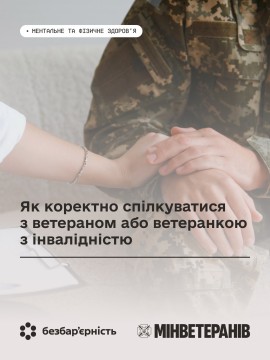
🔷It is important not to change the style of communication with a person just because they have a disability. The focus should be on the person, not the features of their body. A veteran with a disability is first and foremost a person with unique experience, feelings, sense of humor and dignity. Treat them as you would treat anyone else in a similar situation - sincerely, openly and with respect.
🔷Being yourself is the best approach
Stay natural. If it is customary for you to shake hands when you meet someone, do it with a person with a disability. This is appropriate even if the person has difficulty moving their hand or uses a prosthesis.
🔷Pay attention to individual characteristics
Of course, there are situations when communication needs to be adapted. For example, a person with post-communication syndrome who has hearing problems should speak louder.
🔷Adjust physically - not arrogantly, but with respect
If possible, position yourself so that your face is on the same level as the face of the interlocutor. Remember: a wheelchair is a part of personal space, do not lean on it.
🔷Asking is always appropriate
Don't be afraid to ask: "How comfortable are you?", "Can I help? How exactly?"
A person knows their needs best. If they refuse help, accept and respect it.
🔷Patience and sincerity are the key to dialog
When communicating with people who have a speech impairment, give them more time. Show sincere interest - this can motivate them to continue the conversation. If it's a person close to you, suggest using the TippyTalk app - it helps people with speech impairments express themselves better.
Don't impose excessive attention
Not every person with a disability needs extra attention. Don't help without being asked - this can violate boundaries and hurt dignity. Offer and wait for a response.
🔷Respect humor as a way of self-expression
Veterans can jokingly tell stories about their experiences, even traumas. Don't overreact with emotion or pity - it can only alienate. This may be a way to establish contact and show you trust.
Empathy is normal. But pity is humiliating. It is better to support, make them feel equal and help them move on. Avoid devaluing phrases such as "Oh, you poor thing" - they do not carry anything useful or meaningful.
Based on materials from the Barrier-Free Handbook, an initiative and flagship project of First Lady Olena Zelenska.
Based on the materials of the Ministry of Veterans